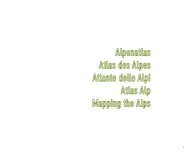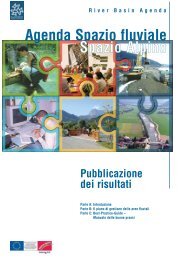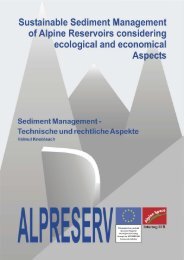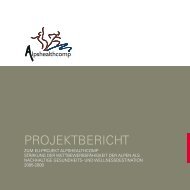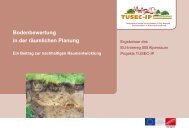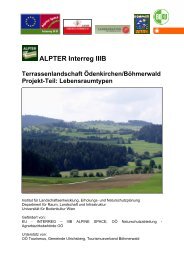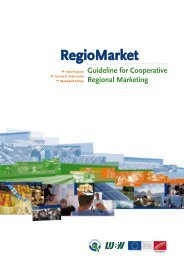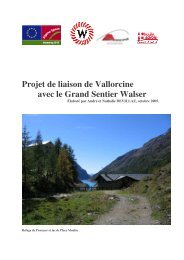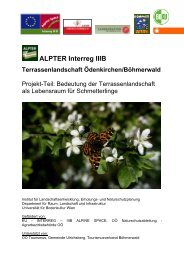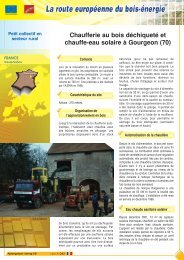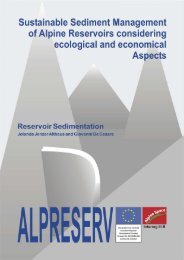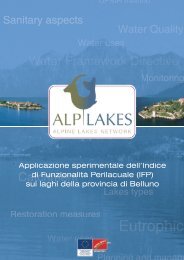WALSERSPRACHE - The four main objectives of the Alpine Space ...
WALSERSPRACHE - The four main objectives of the Alpine Space ...
WALSERSPRACHE - The four main objectives of the Alpine Space ...
Create successful ePaper yourself
Turn your PDF publications into a flip-book with our unique Google optimized e-Paper software.
VERS UNE “LANGUE” DES WALSERS: LA PERSPECTIVE DIACHRONIQUE ET COMPARATIVE<br />
<strong>the</strong>m. <strong>The</strong> Walsers have elected Titzschu, <strong>the</strong>ir ancestral language, as <strong>the</strong> aptest verbal<br />
medium to pass on <strong>the</strong>ir civilisation. It happens however <strong>the</strong>ir language is on <strong>the</strong> brink<br />
<strong>of</strong> extinction and <strong>the</strong>refore it needs revitalizing. To do so <strong>the</strong> narrow boundaries <strong>of</strong> an<br />
oral-only approach must be overcome and this language studied from an historical perspective.<br />
To achieve this historical dimension we need delve in writings and Alagna<br />
Valsesia, Piedmont, has <strong>the</strong>m in abundant supply. An entire collection <strong>of</strong> writings about<br />
a grammar and dictionary <strong>of</strong> Titzschu were found in a recently bought historical mansion.<br />
<strong>The</strong>y belonged to a group <strong>of</strong> intellectuals and mountain climbers, among whom<br />
Giovanni Giordani, Antonio Carestia, Giovanni Gnifetti and Giuseppe Farinetti. <strong>The</strong>y<br />
founded a literary circle. Elisa Farinetti and Paolo Viazzo described <strong>the</strong>ir achievements<br />
in two different books. Besides <strong>the</strong> grammar and dictionary, several o<strong>the</strong>r pieces <strong>of</strong> writing<br />
(literary translations, essays, private letters, notary deeds, etc.) have surfaced and<br />
<strong>the</strong>y have been placed at our disposal by <strong>the</strong> Farinetti family. We have not as yet been<br />
able to publish <strong>the</strong>m, but we have drawn words from <strong>the</strong>m for insertion in our dictionary.<br />
<strong>The</strong> presence <strong>of</strong> such a large number <strong>of</strong> writings and <strong>the</strong> pristine state <strong>of</strong> Titzschu in<br />
Alagna Valsesia turn <strong>the</strong> equation around, and we can certainly avail ourselves <strong>of</strong> <strong>the</strong>se<br />
major findings to draw a time-differentiated portrait <strong>of</strong> this language. Alagna in particular<br />
owes this older pattern <strong>of</strong> language to its unique geographical emplacement. When<br />
studying words, we reject <strong>the</strong> proposition that words in this community were moulded<br />
after Italian, a language with hardly any penetration here. If anything at all,<br />
Piedmontese should be taken into account. Comparing <strong>the</strong> endings <strong>of</strong> words under investigation,<br />
we come to <strong>the</strong> conclusion <strong>the</strong>y are <strong>of</strong> <strong>the</strong> oldest possible Germanic stock. We fur<strong>the</strong>rmore<br />
encounter verbs with two infinitives, one <strong>of</strong> which must be from a much older<br />
form and thus a key to a time-differentiated study <strong>of</strong> this language. Be as it may, one no<br />
longer can study Alagna’s Titzschu as a mere oral form <strong>of</strong> language. Basing ourselves on<br />
<strong>the</strong> documents we have, we drew lengthy and detailed dictionary entries, unthinkable <strong>of</strong><br />
before. Very seldom words had to be created from scrap, since most <strong>of</strong> <strong>the</strong> time <strong>the</strong>y<br />
already existed and this language is a match even for major <strong>of</strong>ficial languages.<br />
Whenever creating a new word one has to strictly abide by <strong>the</strong> rules <strong>of</strong> neology and<br />
ensure its acceptance by language informants. We cannot avoid enriching and updating<br />
this language at a time <strong>of</strong> mass-communication. Language informants however are<br />
not solely responsible for every entry, since <strong>the</strong>y <strong>the</strong>mselves fail to remember every word<br />
<strong>of</strong> <strong>the</strong>ir language. At any rate, <strong>the</strong>y must not be made to work with two languages, as if<br />
152



